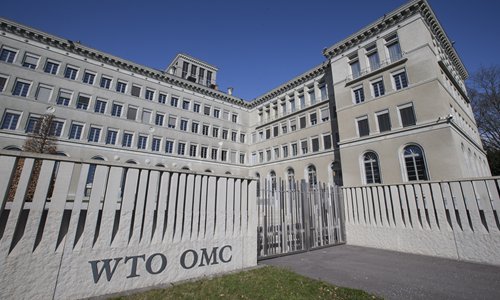Tampering with developing-country status to surely draw backlash
Source:Xinhua Published: 2019/7/29 14:47:15

The World Trade Organization (WTO) headquarters in Geneva, Switzerland. (Xinhua/Xu Jinquan)
The US government's latest hegemonic attempt to coerce the World Trade Organization (WTO) into changing its treatment of developing countries is destined to hit a wall of opposition.
In a memo purportedly promoting WTO reform, the administration threatened action by the US Trade Representative if "substantial progress" toward changes to the special and differentiated treatment for developing members had not been made within 90 days.
When it comes to the reform of one of the world's most important multilateral organizations, messing with its basic principle and trying to override its rules with US laws will beget nothing but failure.
The special and differentiated treatment is a basic right endowed to the WTO's developing members and is a pillar of the organization. It gives full consideration to the gaps between developing and developed nations, embodies the inclusiveness of the multilateral trading system and serves the long-term interests of all countries.
These gaps are comprehensive in nature: income per capita, technological strength, economic structure and quality of development, to name a few. As there is no simple universal definition of "the developed" and "the developing," any assessment of a country's development level must adopt an overall perspective.
However, the United States is attempting to "upgrade" some developing members by overstressing selective indicators and ultimately deprive them of legitimate rights and interests they are entitled to by virtue of their actual status.
It will bring controversy and chaos, putting new obstacles in the way of WTO reforms.
The memo pointed the finger at China and other developing countries, which ignored the yawning gap between China and the developed countries in terms of economic and social development.
It is true that China has become the world's second largest economy, but it is also the biggest developing nation. China's GDP per capita was only 15 percent of that of the United States in 2017, and it has a prominent imbalanced development problem, with over 10 million people still living under the poverty line.
China has never used the special and differentiated treatment as an excuse to shun its due obligations. Since its admission to the WTO over a decade ago, it has actively safeguarded the multilateral trading system and made widely recognized contributions to global free trade and investment.
The United States, in contrast, has trampled WTO rules and undermined the rights and interests of developing countries for its own benefit, casting a shadow over multilateralism and the open world economy.
It obviously timed the memo to serve as a new bargaining chip for the upcoming 12th round of China-US high-level economic and trade consultations.
But the tactic of imposing pressure is nothing new to China and has never worked. After all, the United States needs to show good faith in trade talks. If it plans otherwise, China is ready and has nothing to fear.